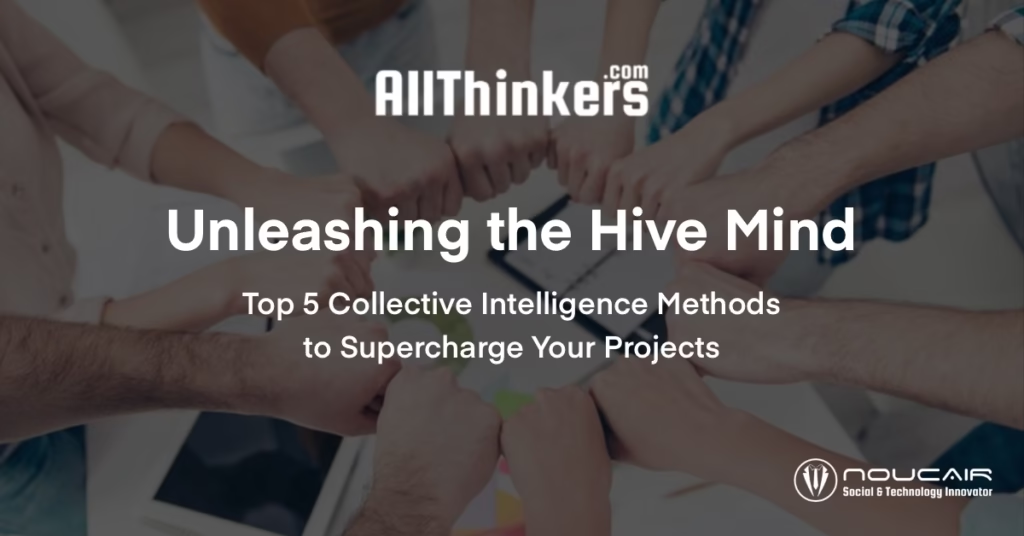Top 5 Collective Intelligence Methods to Supercharge Your Projects
In today’s complex and rapidly evolving world, relying solely on individual expertise is no longer sufficient. To truly innovate and achieve groundbreaking results, we must tap into the power of collective intelligence. As someone deeply passionate about improving collective intelligence and empowering communities, I’ve seen firsthand how these methods can transform projects of any scale. This article explores five key collective intelligence methods that can boost your project’s success, drawing on principles that resonate with the AllThinkers philosophy.
What is Collective Intelligence?
Before diving into the methods, let’s define collective intelligence. It’s the enhanced capacity of a group to solve problems, innovate, and make decisions by combining the knowledge, skills, and perspectives of its members. It’s about more than just aggregating opinions; it’s about creating a synergistic effect where the whole becomes greater than the sum of its parts.
Top 5 Collective Intelligence Methods:
- Brainstorming & Brainwriting:
- Description: The classic brainstorming session encourages rapid generation of ideas in a group setting. Brainwriting is a variation where participants write down ideas individually before sharing, reducing the influence of dominant personalities.
- Benefit: Excellent for initial idea generation, fostering creativity, and exploring a wide range of possibilities.
- Project Boost: Use brainstorming to kick off a project, define its scope, or generate solutions to specific challenges. Brainwriting can be particularly helpful in diverse teams to ensure everyone’s voice is heard.
- Delphi Method:
- Description: A structured communication technique involving a panel of experts who answer questionnaires in multiple rounds. Responses are anonymized and shared with the panel, allowing for refinement of opinions and convergence towards a consensus.
- Benefit: Effective for forecasting, decision-making on complex issues, and achieving reliable group judgment.
- Project Boost: Employ the Delphi method for long-term project planning, risk assessment, or evaluating potential strategies.
- Prediction Markets:
- Description: Marketplaces where participants trade contracts based on the outcome of future events. The prices of the contracts reflect the collective prediction of the group.
- Benefit: Powerful for forecasting and aggregating information, especially in situations with uncertainty.
- Project Boost: Utilize prediction markets to forecast project milestones, assess the likelihood of success for different approaches, or predict market trends relevant to your project.
- Crowdsourcing:
- Description: Outsourcing tasks or problems to a large, undefined group of people, typically via the internet.
- Benefit: Enables access to a diverse pool of talent, cost-effective solutions, and rapid scaling.
- Project Boost: Leverage crowdsourcing for tasks like data collection, design, testing, or fundraising. Platforms like Kickstarter and Indiegogo are prime examples of crowdsourcing in action.
- Online Forums & Communities:
- Description: Creating dedicated online spaces for discussion, knowledge sharing, and collaboration among project stakeholders.
- Benefit: Fosters continuous engagement, facilitates problem-solving, and builds a sense of community.
- Project Boost: Develop online forums to support project communication, gather feedback, and encourage ongoing contributions from team members, clients, or users. AllThinkers itself is a testament to the power of online communities for collective intelligence.
Key Principles for Success
- Diversity: Include participants with varied backgrounds, skills, and perspectives.
- Inclusivity: Ensure everyone feels comfortable contributing and that all voices are heard.
- Transparency: Make the process and the results clear to all participants.
- Facilitation: Provide skilled guidance to keep the process focused and productive.
- Technology: Utilize appropriate technology to support communication, collaboration, and data analysis.
Conclusion
Collective intelligence is not just a buzzword; it’s a fundamental shift in how we approach problem-solving and innovation. By embracing these methods and principles, we can unlock the collective potential of our teams and communities, leading to more successful and impactful projects. As we move towards an increasingly interconnected future, the ability to harness collective intelligence will be a crucial skill for individuals and organizations alike.


